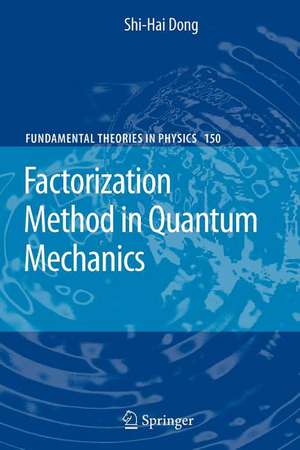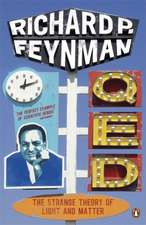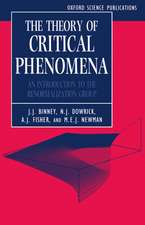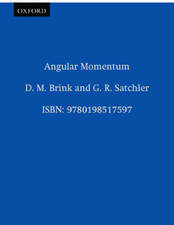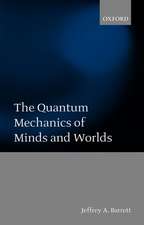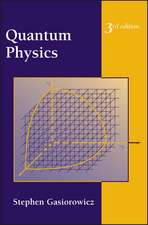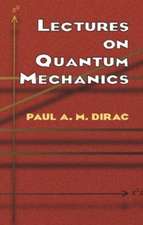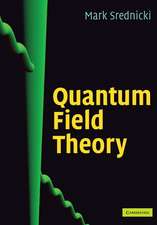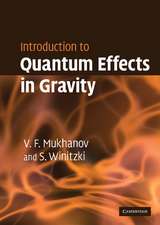Factorization Method in Quantum Mechanics: Fundamental Theories of Physics, cartea 150
Autor Shi-Hai Dongen Limba Engleză Paperback – 22 noi 2010
| Toate formatele și edițiile | Preț | Express |
|---|---|---|
| Paperback (1) | 641.85 lei 6-8 săpt. | |
| SPRINGER NETHERLANDS – 22 noi 2010 | 641.85 lei 6-8 săpt. | |
| Hardback (1) | 647.40 lei 6-8 săpt. | |
| SPRINGER NETHERLANDS – 9 feb 2007 | 647.40 lei 6-8 săpt. |
Din seria Fundamental Theories of Physics
- 20%
 Preț: 1002.37 lei
Preț: 1002.37 lei -
 Preț: 426.56 lei
Preț: 426.56 lei - 20%
 Preț: 819.48 lei
Preț: 819.48 lei - 18%
 Preț: 779.26 lei
Preț: 779.26 lei - 18%
 Preț: 955.25 lei
Preț: 955.25 lei - 18%
 Preț: 950.52 lei
Preț: 950.52 lei - 24%
 Preț: 794.89 lei
Preț: 794.89 lei - 18%
 Preț: 948.47 lei
Preț: 948.47 lei - 15%
 Preț: 589.80 lei
Preț: 589.80 lei - 18%
 Preț: 1229.73 lei
Preț: 1229.73 lei - 15%
 Preț: 587.83 lei
Preț: 587.83 lei - 18%
 Preț: 1236.06 lei
Preț: 1236.06 lei - 18%
 Preț: 946.87 lei
Preț: 946.87 lei -
 Preț: 394.87 lei
Preț: 394.87 lei - 18%
 Preț: 954.93 lei
Preț: 954.93 lei - 18%
 Preț: 1241.10 lei
Preț: 1241.10 lei - 18%
 Preț: 954.93 lei
Preț: 954.93 lei - 18%
 Preț: 953.35 lei
Preț: 953.35 lei - 18%
 Preț: 948.92 lei
Preț: 948.92 lei - 15%
 Preț: 648.05 lei
Preț: 648.05 lei - 18%
 Preț: 1232.09 lei
Preț: 1232.09 lei - 18%
 Preț: 996.78 lei
Preț: 996.78 lei - 18%
 Preț: 946.41 lei
Preț: 946.41 lei - 15%
 Preț: 640.24 lei
Preț: 640.24 lei - 15%
 Preț: 636.80 lei
Preț: 636.80 lei -
 Preț: 391.79 lei
Preț: 391.79 lei - 18%
 Preț: 780.19 lei
Preț: 780.19 lei -
 Preț: 391.79 lei
Preț: 391.79 lei - 15%
 Preț: 649.06 lei
Preț: 649.06 lei -
 Preț: 397.76 lei
Preț: 397.76 lei - 24%
 Preț: 586.69 lei
Preț: 586.69 lei - 15%
 Preț: 644.95 lei
Preț: 644.95 lei - 18%
 Preț: 1228.15 lei
Preț: 1228.15 lei
Preț: 641.85 lei
Preț vechi: 755.13 lei
-15% Nou
Puncte Express: 963
Preț estimativ în valută:
122.82€ • 127.98$ • 101.69£
122.82€ • 127.98$ • 101.69£
Carte tipărită la comandă
Livrare economică 03-17 aprilie
Preluare comenzi: 021 569.72.76
Specificații
ISBN-13: 9789048174478
ISBN-10: 9048174473
Pagini: 324
Ilustrații: XIX, 289 p.
Dimensiuni: 155 x 235 x 17 mm
Greutate: 0.46 kg
Ediția:2007
Editura: SPRINGER NETHERLANDS
Colecția Springer
Seria Fundamental Theories of Physics
Locul publicării:Dordrecht, Netherlands
ISBN-10: 9048174473
Pagini: 324
Ilustrații: XIX, 289 p.
Dimensiuni: 155 x 235 x 17 mm
Greutate: 0.46 kg
Ediția:2007
Editura: SPRINGER NETHERLANDS
Colecția Springer
Seria Fundamental Theories of Physics
Locul publicării:Dordrecht, Netherlands
Public țintă
ResearchCuprins
METHOD.- THEORY.- LIE ALGEBRAS SU(2) AND SU(1, 1).- APPLICATIONS IN NON-RELATIVISTIC QUANTUM MECHANICS.- HARMONIC OSCILLATOR.- INFINITELY DEEP SQUARE-WELL POTENTIAL.- MORSE POTENTIAL.- PÖSCHL-TELLER POTENTIAL.- PSEUDOHARMONIC OSCILLATOR.- ALGEBRAIC APPROACH TO AN ELECTRON IN A UNIFORM MAGNETIC FIELD.- RING-SHAPED NON-SPHERICAL OSCILLATOR.- GENERALIZED LAGUERRE FUNCTIONS.- NEW NONCENTRAL RING-SHAPED POTENTIAL.- PÖSCHL-TELLER LIKE POTENTIAL.- POSITION-DEPENDENT MASS SCHRÖDINGER EQUATION FOR A SINGULAR OSCILLATOR.- APPLICATIONS IN RELATIVISTIC QUANTUM MECHANICS.- SUSYQM AND SWKB APPROACH TO THE DIRAC EQUATION WITH A COULOMB POTENTIAL IN 2+1 DIMENSIONS.- REALIZATION OF DYNAMIC GROUP FOR THE DIRAC HYDROGEN-LIKE ATOM IN 2+1 DIMENSIONS.- ALGEBRAIC APPROACH TO KLEIN-GORDON EQUATION WITH THE HYDROGEN-LIKE ATOM IN 2+1 DIMENSIONS.- SUSYQM AND SWKB APPROACHES TO RELATIVISTIC DIRAC AND KLEIN-GORDON EQUATIONS WITH HYPERBOLIC POTENTIAL.- QUANTUM CONTROL.- CONTROLLABILITY OF QUANTUM SYSTEMS FOR THE MORSE AND PT POTENTIALS WITH DYNAMIC GROUP SU(2).- CONTROLLABILITY OF QUANTUM SYSTEM FOR THE PT-LIKE POTENTIAL WITH DYNAMIC GROUP SU(1, 1).- CONCLUSIONS AND OUTLOOKS.- CONCLUSIONS AND OUTLOOKS.
Recenzii
From the reviews:
"An up-to-date organized account of material that can be addressed to an interdisciplinary graduate-level audience. … Besides the elegance and the effectiveness in characterizing matrix-elements, a motivation for the algebraic approach also relies in the pedagogical expectation that beginners can be better driven to topics like coherent states and supersymmetric Quantum Mechanics. … The book can be generally addressed to graduate students and young researchers in physics, theoretical chemistry, applied mathematics and electrical engineering … ." (Giulio Landolfi, Zentralblatt MATH, Vol. 1130 (8), 2008)
"The book under review is an interesting and useful collection of results which fall under the headings of ‘factorization method’, ‘Darboux/Crum transformation’, ‘supersymmetric quantum mechanics’, ‘intertwining operator method’ and ‘shape invariance’. … can be used by researchers in the field and by students of quantum mechanics. … the overall impression of the book is that it is useful for a broad audience of physicists and mathematical physicists." (Marek Nowakowski, Mathematical Reviews, Issue 2008 k)
"An up-to-date organized account of material that can be addressed to an interdisciplinary graduate-level audience. … Besides the elegance and the effectiveness in characterizing matrix-elements, a motivation for the algebraic approach also relies in the pedagogical expectation that beginners can be better driven to topics like coherent states and supersymmetric Quantum Mechanics. … The book can be generally addressed to graduate students and young researchers in physics, theoretical chemistry, applied mathematics and electrical engineering … ." (Giulio Landolfi, Zentralblatt MATH, Vol. 1130 (8), 2008)
"The book under review is an interesting and useful collection of results which fall under the headings of ‘factorization method’, ‘Darboux/Crum transformation’, ‘supersymmetric quantum mechanics’, ‘intertwining operator method’ and ‘shape invariance’. … can be used by researchers in the field and by students of quantum mechanics. … the overall impression of the book is that it is useful for a broad audience of physicists and mathematical physicists." (Marek Nowakowski, Mathematical Reviews, Issue 2008 k)
Textul de pe ultima copertă
This Work introduces the factorization method in quantum mechanics at an advanced level with an aim to put mathematical and physical concepts and techniques like the factorization method, Lie algebras, matrix elements and quantum control at the Reader’s disposal. For this purpose a comprehensive description is provided of the factorization method and its wide applications in quantum mechanics which complements the traditional coverage found in the existing quantum mechanics textbooks. Related to this classic method are the supersymmetric quantum mechanics, shape invariant potentials and group theoretical approaches. It is no exaggeration to say that this method has become the milestone of these approaches. In fact the Author’s driving force has been his desire to provide a comprehensive review volume that includes some new and significant results about the factorization method in quantum mechanics since the literature is inundated with scattered articles in this field, and to pave the Reader’s way into this territory as rapidly as possible. The result: clear and understandable derivations with the necessary mathematical steps included so that the intelligent reader should be able to follow the text with relative ease, in particular when mathematically difficult material is presented.
Audience:
Researchers and students of physics, mathematics, chemistry and electrical engineering.
Audience:
Researchers and students of physics, mathematics, chemistry and electrical engineering.
Caracteristici
A fresh outlook and new ways of handling the important quantum systems in all branches of physics and chemistry
